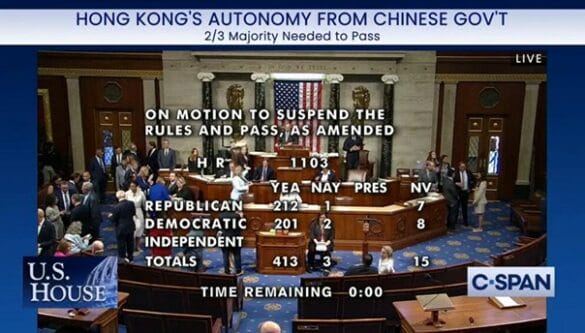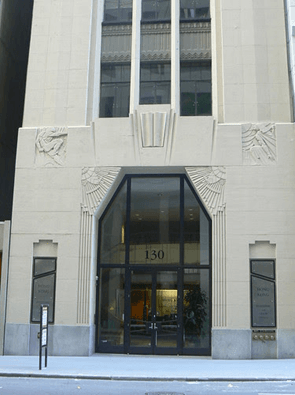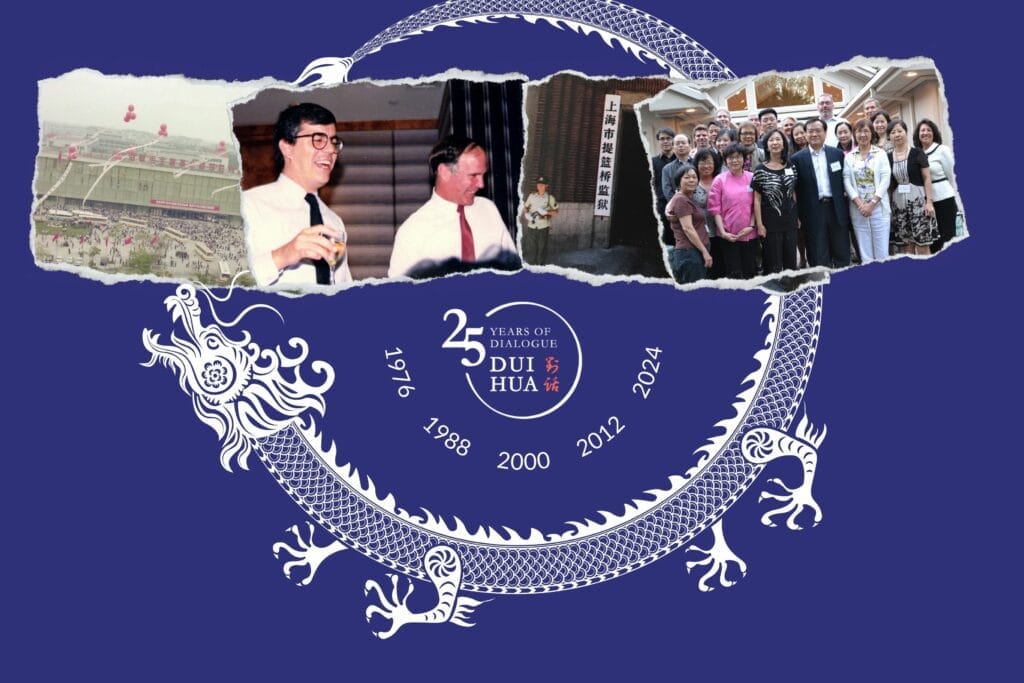With the 2024 US Presidential Election less than five weeks away, polls show a tight race between the two candidates. Dui Hua examines their stances on Beijing and what awaits Sino-US relations after the US House of Representatives passed over two dozen bills aimed at safeguarding US interests against China. Among these, the “Hong Kong Economic and Trade Office Certification Act,” likely will put the HKETO status at risk.
EVENTS
Embed from Getty ImagesUpcoming Event
Executive Director John Kamm will speak at the University Club of San Francisco on Thursday, October 17. He’ll explore who China’s leader, Xi Jinping, prefers to win the November 2024 election, Donald Trump or Kamala Harris. See our website for the details.
US Election
A story making the rounds in Hong Kong in early 2017 went something like this: Shortly after Donald Trump won the United States (US) presidential election in November 2016, a senior Chinese official visited Hong Kong, where, during a meeting with business leaders, he asked for their impressions of the newly elected US leader. One individual, who had had dealings with Trump, gave this simple assessment: “He’s crazy.”
Not long afterward, President Xi Jinping experienced firsthand Trump’s unpredictability when he visited the US president at his Mar-a-Lago estate in Florida. Trump left the room during dinner. When he returned, Trump told President Xi that he had just ordered a missile-strike on Syria.
Embed from Getty ImagesTrump’s unpredictability also extended to his own team. In May 2018, Trump angrily denied knowing the name of Matt Pottinger, his top China advisor on the National Security Council who had met with President Xi in 2017. “He doesn’t exist,” said Trump in response to a New York Times article about a summit with North Korea’s leader. And then on September 12, 2017, President Trump used his position as chairperson of the UN Security Council to accuse China of meddling in the US’ mid-term congressional elections. His accusation reportedly took his advisors by surprise.
Since becoming the Republican party’s nominee for the third time in 2024, Trump has been bolstered by a GOP platform that calls for revoking China’s Most Favored Nation (MFN)Trading status, reducing reliance on China for critical imports, and forbidding China’s acquisition of American farmland and companies in critical industries. As discussed in our last Digest, Americans see President Biden as weak on China; they view Trump as far tougher. A Pew Research poll in our lead story showed that eight in 10 Americans have an unfavorable opinion of China, the highest number since Pew began recording this metric five years ago. Whereas 40 percent of all Americans polled by Pew consider China an enemy, 59 percent of Republicans view China that way, compared to only 28 percent of Democrats who consider the PRC as an enemy. When Trump attacks China, he plays to his base.
Embed from Getty ImagesRevocation of China’s MFN, banning Chinese purchases of American farmland, and reducing reliance on China’s imports are not the only challenges to US-China relations. Some in Congress also want to decertify Hong Kong’s Economic and Trade Offices (see below) in the US and slap more sanctions on Chinese officials.
Reflecting the high Chinese American population of California and her San Francisco hometown, Vice President Kamala Harris – who met Chinese President Xi Jinping on one occasion for 45 minutes – has adopted a more moderate stance than Trump. In effect, she has aligned herself with President Biden’s China policy. She sees China as a competitor, not an enemy. She has co-sponsored bills in the Senate decrying China’s treatment of Uyghurs and the loss of freedoms in Hong Kong, but she has been joined by many other Senators in co-sponsoring these bills.
Harris’ pick for vice president, Minnesota Governor Tim Walz, has had a long relationship with China, having taught there in 1989, and later spending his honeymoon there. He visited China 30 times before 2003 and organized trips to the country for high school students. So deep is his relationship with China that the GOP’s House Oversight Committee has launched an investigation into it.
Embed from Getty ImagesWalz’s experiences in China have made him sympathetic to the Chinese people but also critical of the government. During his stint on the Congressional-Executive Commission on China (CECC), he has testified and lent vocal support for activists such as Huang Qi, Tan Zuoren, the blind lawyer Chen Guangcheng, and Nobel Peace Prize laureate Liu Xiaobo.
Harris did not mention China in her remarks on economic policy delivered on August 16, 2024. The Democratic Party’s platform adopted by the Platform Committee prior to the convention in Chicago that opened on August 19, 2024, commits to “outcompeting China” while seeking to “derisk” but not decouple. It mentions cooperation with China on climate change and fentanyl trafficking. It seeks to maintain the status quo with respect to Taiwan. No mention is made of revoking MFN or other policies favored by Republicans.
Embed from Getty ImagesThe debate between Harris and Trump on September 10 mentioned tariffs imposed on Chinese goods by Trump and maintained by the Biden administration. Both candidates decried the deaths of Americans caused by the illegal smuggling of fentanyl. Harris slammed Trump for praising Xi Jinping.
Who Does China Favor?
Views are mixed among Western China experts on who China prefers to win the presidential sweepstakes in November, Kamala Harris or Donald Trump.
One camp thinks China prefers Trump as he would alienate allies, threaten support for Ukraine, and reduce support for Taiwan in its standoff with China. The other camp thinks that China prefers Harris, as Trump would revoke China’s MFN and take other steps that would damage China’s economy.
In the Economist/YouGov poll released on September 11, of the 1,626 American adults polled 37 percent think China prefers Harris as the winner of the November election, while 26 percent think China prefers Trump. Thirteen percent think China doesn’t have a preference. The margin of error was 3.3 percent.
With under two months to go before election day in the US, we’ll find out soon enough who will steer America’s relations with China in the critical years ahead.
“China Week”
The United States House of representatives debated and passed more than two dozen bills aimed squarely at China during the week of September 9, dubbed “China Week”. Notable bills that passed included legislation that could decide the fates of the US-China Science and Technology Agreement (STA) and the Hong Kong Economic and Trade Offices (HKETO) in Washington, New York, and San Francisco.
The House on September 10 passed the STA Enhanced Congressional Notification, a bill that requires the US Department of State to notify Congress at least 30 days ahead of any science and technology agreements with China. After the current version of the agreement (extended for five years in 2018) expired in 2023, it was quietly extended twice for six months, in August 2023 and in February 2024. In August, 2024, Dui Hua learned form a US Official that the negotiation for a new STA agreement had started and was making positive progress. The passing of the notification act, however, could hinder the negotiation, if not completely derail it.
HKETO Status At Risk

The US House of Representative passed the HKETO Certification Act on September 10, with a lopsided vote of 413 to 3. The act requires the US President to annually certify whether HKETOs should continue to have diplomatic privileges and immunities now that Hong Kong’s special autonomous status has been decertified.
HKETOs in the US were established pursuant to the Hong Kong Policy Act, enacted by Congress in 1992, to treat Hong Kong separately from China for matters of trade and economic relations.
On May 30, 2024, subversion convictions of Hong Kong pro-democracy activists renewed calls by members of Congress to decertify and strip HKETO in the US of diplomatic immunity, a move that could force the closure of the offices and likely sale of the buildings where the offices are housed.

In early 2023, Congressman Chris Smith (R-New Jersey) and Congressman McGovern Jim McGovern (D-Massachusetts) introduced the HKETO Certification Act which, in the unlikely event that it becomes law, would force the closure of the HKETO offices.
It’s not the first time the New Jersey Congressman has targeted the HKETO. A few weeks before the act that was passed by the House on September 10 was introduced, Smith teamed with Tom Suozzi (D-New York) to propose legislation that would rename the street in Washington where the HKETO is located, to “Jimmy Lai Way”, to honor the democracy activist and publisher currently imprisoned in solitary confinement at Hong Kong’s Stanley Prison. Like the HKETO Certification Act, this bill has a companion bill in the Senate. Unlike the HKETO Certification Act, it is likely to pass both chambers of Congress with veto-proof majorities and be signed by the president.
Echoing congressional concerns over the convictions of the Hong Kong activists, the US State Department announced, on May 31, 2024, that it would impose visa restrictions on Hong Kong and Mainland officials involved in the convictions. In a press statement that same day, the State Department said that the US was “deeply concerned by the guilty verdicts” and that its new sanctions would target individuals who are responsible for implementing the National Security Law, pursuant to Section 212(a)(3)(C) of the Immigration and Nationality Act. The State Department updated its Hong Kong Business Advisory on September 6, 2024, following HKSARS announcement that “undesirable” individuals will be denied from boarding flights to Hong Kong.
PUBLICATION HIGHLIGHTS
Dragon Years: Remembrance of Times Past (2000)

The latest episode of Dui Hua’s limited podcast series, Dragon Years: Remembrance of Times Past journeys back to 2000, the year of the Metal Dragon. The year marked the beginning of a new millennium and Dui Hua’s debut as an official NGO. In this episode, John Kamm and China trade pioneer-turned-Dui Hua board member Bill Simon had a lively discussion of how China has changed and how it has stayed the same. The duo reflects on their work with Dui Hua and what US officials got wrong about increased trade with China while finding reasons to be optimistic for the future of US-China relations.
JOHN KAMM REMEMBERS
From John Kamm Remembers, a series written by Dui Hua’s founder recounting his advocacy for prisoners in China.
Ulaanbaatar: Courage on the Path of Reform

Thirty-four years ago, shortly after Mongolia began its transition to democracy following decades under Soviet influence, John Kamm led the first US trade delegation to the landlocked nation in September 1990, embarking on a memorable four-day trip to the capital Ulaanbaatar. Read more
Six Bookstores and a Restaurant
John Kamm frequented China’s state-run bookstores during his trips and discovered publications that reflected socio-political trends in the Mainland and contained political cases for his advocacy work. One bookstore search led him to a North Korean restaurant in Beijing. Read more
The Games of the 29th Olympiad: Triumph and Tragedy
We revisit the Beijing Olympics that took place 16 years ago, an important milestone for China. But in the end, the Games did not improve its international image as Beijing had hoped. Read more
HUMAN RIGHTS JOURNAL
From the Human Rights Journal, a blog offering original analysis and translations related to human rights and rule of law developments in China.
Arbitrary Detentions of Taiwanese in China

The Mainland China has been the top destination for Taiwanese working or living long-term overseas since the ‘90s. However, the number of Taiwanese visiting China has dropped over the past five years, as the Island finds itself caught up in complicated international relationships and the Mainland uses increasingly hostile rhetoric. This post highlights the recent cases of six Taiwanese who were arbitrarily detained under the guise of “endangering state security.” Read more
Curious Timing: Disapprovals & Presence of Counsel in SPC Death Penalty Reviews
This two-parts journal explores the Supreme People’s Court’s recent disclosures of death penalty decisions made shortly after China’s human rights review in Geneva in January 2024. It looks at the demographics of those sentenced to death, trends in types of crime and decision review times, the reasons why some decisions were disapproved, the presence of counsel during rulings, and inconsistencies in the information provided by the disclosures.
PRESS STATEMENT
Dui Hua Welcomes the Release of Pastor David Lin
US citizen David Lin (林大卫) was released from Beijing Number Two Prison on September 15, 2024. Pastor Lin was on the priority list of three Americans considered by the US Department of State to be wrongfully detained. Read press statement
Li Yan: Life sentence commuted, 25-year sentence reduced
Dui Hua research found Li Yan, a victim of domestic abuse who was convicted of murdering her abusive husband, has received her first sentence reduction in 2023. Read press statement
PRISONER UPDATES
Dui Hua’s Prisoner Updates provide the latest information uncovered through research and direct dialogue with the Chinese government.
In these updates: Pastor Bao Guohua and wife Xing Wenxiang might have been granted clemency since their imprisonments; Activists Huang Xueqing and Wang Jianbing’s appeal concluded without trial in Guangdong. Read more
Christians from Guiyang and Jiangxi sentenced for inciting subversion; Yang Chih-yuan became the first Taiwanese to be convicted of splittism on mainland China. Read more
Clemency granted to Falun Gong practitioners; Women’s rights activist Li Qiaochu release after completed her sentence of 3 years and 8 months on August 3; Pastor and member of Shanxi house churches sentenced for organizing illegal border crossings. Read more
Subscribe here to receive Dui Hua publications by email.
